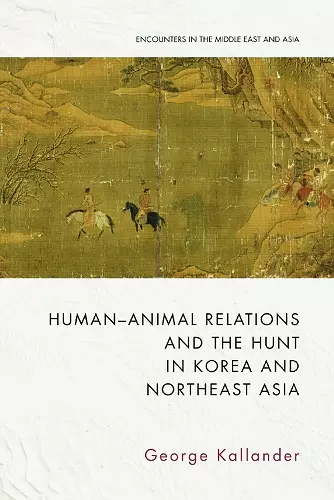Human-Animal Relations and the Hunt in Korea and Northeast Asia
Format:Hardback
Publisher:Edinburgh University Press
Published:17th May '23
Currently unavailable, and unfortunately no date known when it will be back
This hardback is available in another edition too:
- Paperback£24.99(9781399512107)

This book focuses on the transitional period in late Koryŏ and early Chosŏn dynasty Korea from the 1270s until 1506, situating the Korean peninsula in relation to the neighbouring Mongol Empire and Ming Dynasty China. During this period, Korean statesmen expanded their influence over people and the environment. Human-animal relations became increasingly significant to politics, national security, and elite identities. Animals, both wild and domestic, were used in ritual sacrifices, submitted as tax tribute, exchanged in regional trade, and most significantly, hunted. Royal proponents of the hunt, as a facet of political and military legitimacy, were contested by a small but vocal group of officials. These vocal elites attempted to circumscribe royal authority by co-opting hunting through Confucian laws and rites, either by regulating the practice to a state ritual at best, or, at worst, considering it a barbaric exercise not befitting of the royal family. While kings defied the narrow Confucian views on governance that elevated book learning over martial skills, these tensions revealed how the meaning of political power and authority were shaped. Attention to animals and hunting depicts how a multiplicity of cultural references—Sinic, Korean, Northeast Asian, and steppeland—existed in tension with each other and served as a battleground for defining politics, society, and ritual. Kallander argues that rather than mere resources, animals were a site over which power struggles were waged.
This innovative study of premodern Korea explores vital issues like the nature of rulership, foreign relations, and the state’s efforts to extract human and animal resources throughout the realm. It is an inspired—and inspiring—illustration of how to integrate Korea into the broader span of eastern Eurasian history. -- David Robinson, Colgate University
[A] formidable contribution to the young but growing fields of Korean animal studies and environmental history [...] Kallander’s account offers compelling insights to many different kinds of readers, from those interested in Korea’s environmental history and the fate of its [...] wild animals, to scholars interested in further evidence of Mongol legacies in premodern Korea or the politics and ideology of the Koryŏ- Chosŏn transition. Such a rich and thoroughly accessible volume shows the exciting possibilities that come from examining Korean history through a multispecies lens. -- Joseph Seeley, University of Virginia * Journal of Korean Studies *
Kallander’s most recent addition to the field of premodern Korean history is a valuable foray into the history of human–animal relations on the peninsula. -- Aaron Molnar, Harvard University * International Journal of Asian Studies *
Kallander presents a society that was in awe of the wilderness, and the hunted creatures were woven into the fabric of the kingdoms’ traditions, stories, and clothing. The book dives into this world by use of government records from the Koryŏ and Chosŏn courts but is augmented by use of art and maps showing the locations and displays of creatures. Kallander’s argument is wide-ranging and introduces aspects of economics, politics, philosophy, international relations, masculinity, climate change, state rituals, and uxorilocal marriage customs. -- Thomas Quartermain * The Journal of Asian Studies *
ISBN: 9781399512091
Dimensions: unknown
Weight: unknown
320 pages